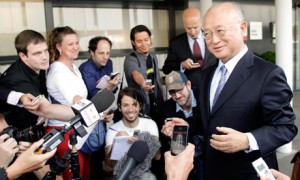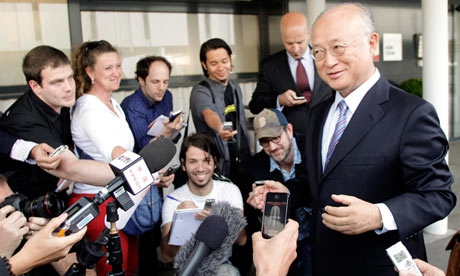 Top spies flock to Vienna, the home of the IAEA and where Tehran has replaced Moscow as the world's bogeyman
Top spies flock to Vienna, the home of the IAEA and where Tehran has replaced Moscow as the world's bogeymanIn the early years of the Cold War, Vienna was the spy capital of the world, a cosmopolitan, divided city beside the Iron Curtain that buzzed with intrigue as the major powers vied for the upper hand. Now the city of shadows that provided the backdrop for the Third Man is united, prosperous and pristine, but the spies are back in force � this time withIran�playing the bogeyman role of the Soviet Union.
It is the world's nuclear watchdog, the�International Atomic Energy Agency (IAEA), that draws the world's international agencies. Its quarterly board meetings are attended by top security officials and nuclear scientists from around the world, including Iran, and the spies follow them to Vienna. The facts of the Iran's nuclear programme are the holy grail of the intelligence world. The existence and extent of any covert weapons activity � suspected in the west, denied in Tehran � could determine whether the world goes to war again in the Middle East.
As the international arbiter of the nuclear world, the IAEA has inevitably become an intelligence target too. The name of the game is to influence its judgments, and failing that, at least find out what is in its files.
As the international stakes rise, so have the pressures on the IAEA. Yukiya Amano, currently director general, was elected in 2009 by a very narrow margin after a divisive contest in which Amano was widely perceived as being the west's candidate. The leaks have emerged as he is seeking re-election and at the same time trying to strengthen the investigative powers of the safeguards department � the part of the IAEA devoted to verifying the declarations made by states � in the face of resistance led by�Russia�and about a dozen other countries.
Opponents of Amano's plan are concerned that the proposed reforms would make the IAEA increasingly reliant, in cases like Iran, on intelligence and information supplied by the west and Israel.
In a�report on the new safeguards plan, Mark Hibbs, a nuclear expert at the Carnegie Endowment for International Peace, said Russia's stance on the IAEA board was being dictated directly by President�Vladimir Putin, who sees it as an arena for confronting US influence.
"Currently, Russia's intelligence agencies are heavily intervening in IAEA safeguards matters, and they fear the IAEA could become a tool of the United States and its allies, countries that have supplied nearly all of the intelligence pointing to military and�nuclear weapons�activities in Iran," he wrote.
Yossi Melman, the Israeli�co-author of Spies Against Armageddon, described Vienna as a "nest of spies".
"There is a great volume of traffic of senior officials and nuclear scientists coming to the IAEA, particularly when there is a board meeting. So they are targets while they are there for break-ins, bugging or recruitment," he said. His book describes a Mossad operation to break in tothe Vienna flat of the head of the Syrian atomic energy commission, Ibrahim Othman, in March 2007, in which Israeli spies are alleged to have found details on a laptop computer about Syria's covert construction of anuclear reactor at al-Kibar. The site was bombed�six months later.
Mossad also explored ways of trying to compromise the former IAEA director general,�Mohamed ElBaradei, whom Israel believed was overly sympathetic to Iran. One plot, never carried out, was to deposit funds in his bank account that he would not be able to explain and then to spread rumours he was in the pay of Tehran.
Melman added that Britain's external spy service British spies had been successful in extracting intelligence in Vienna about the Iranian programme.
"If you speak to Mossad people," he said, "they are almost very complimentary about MI6's capacity and its success against the Iranians."
With the world's spies pressing in on all sides, the IAEA has sought to tighten its own security by narrowing the circle of officials and analysts who deal with the most sensitive material. That in turn has led to complaints that sceptical and dissenting voices are not being heard.
The Guardian has also learned that for security reasons, there are no longer any Farsi speakers in the safeguards department to analyse the flow of documents coming in about the Iranian nuclear programme.
Agency officials and western diplomats, while neither confirming nor denying the absence of Farsi speakers in safeguards, say there is sufficient language expertise in the agency as a whole for it not to matter. However, Herman Nackaerts, the current head of safeguards, is said to have complained privately that not having Farsi speakers working directly for him has harmed his ability to conduct his enquiries.
A former inspector said: "It is a serious problem. We asked for something to be done about it but we were told it was a matter of trust, that these people would have relatives in Iran and would be open to pressure."
By The Guardian
The Iran Project is not responsible for the content of quoted articles.











